Epics and Monsters
 Parts of the below were developed in conversation with Niki Haringsma, whose Black Archive on ‘Love & Monsters’ is forthcoming, and who was recently heard in conversation with El. Again, I alone am to blame for the faults of what follows.
Parts of the below were developed in conversation with Niki Haringsma, whose Black Archive on ‘Love & Monsters’ is forthcoming, and who was recently heard in conversation with El. Again, I alone am to blame for the faults of what follows.
*
So, contrary to those who feel it’s become ‘too PC’ (a misprision that is interesting by itself), Doctor Who these days looks increasingly like it is taking a reactionary turn – albeit one of a complex kind – as it seems to drift from being an “accidental critique of milquetoast liberalism” (as Kit Power put it) into an outright accomodation with the systems it has found itself unable to effectively struggle against. This makes Chibnall’s show, in its own way, a mirror to Moffat’s, which was also deeply concerned with the limits of resistance to systems.
This is a space for analysing the political attitude found in the content. But there is also reason to look at what the form tells us, what it assumes, what it permits, etc. As we’ve already talked about elsewhere, the form and content are actually inextricable.
Let’s take a detour into Brechtian ‘Epic Theatre’.
Brecht’s theatre doesn’t aim to ‘resolve’ political questions even when it is morally and politically clear because – at least in his mind, and one is free to disagree with him – its moral and political project is an invitation to the audience to contemplate profound contradictions and problems in society.
The problem with bourgeois theatre, for Brecht (and he sees Lukacs as doing the same thing) is that it is “afraid of production”, i.e. it hides it. Realist theatre (Ibsen, Strindberg, etc) tries to create an illusion of realism, an empathic connection with the characters, which not only smooths over social contradictions but also masks production itself. (Modern TV, which strives to look cinematic, arguably does this same thing far more than old-school TV, which was often more-or-less televised theatre.) Brecht dislikes this as a Marxist, and one with a particular emphasis on production as fundamental to social existence (an emphasis which I personally think is quite proper for a Marxist, but which is sadly lacking from much actual Marxism).
It is this masking of production which, perhaps more than anything else for Brecht, creates the bourgeois illusion of fixity which he aims to dispel. Epic Theatre concentrates on production both in terms of how people actually produce history and in terms of how theatre itself is produced. This coherence is, paradoxically, a key way in which it aims to reveal social contradictions.
The irony is that modern Doctor Who is arguably a lot less like Epic Theatre in this sense than most classic Who manages to be by accident! Classic Who is arguably far more concerned with political issues (re society and history) than New Who. But it also accidentally estranges the audience by highlighting its own processes of production, simply by virtue of its production values being so shoddy that it inadvertently showcases them!

 As noted last time, through its strategy – deliberate or not – of eloquent silence, ‘Demons of the Punjab’
As noted last time, through its strategy – deliberate or not – of eloquent silence, ‘Demons of the Punjab’  The historian Yasmin Khan, who wrote
The historian Yasmin Khan, who wrote  “There has never been a document of culture, which is not simultaneously one of barbarism. Not even
“There has never been a document of culture, which is not simultaneously one of barbarism. Not even 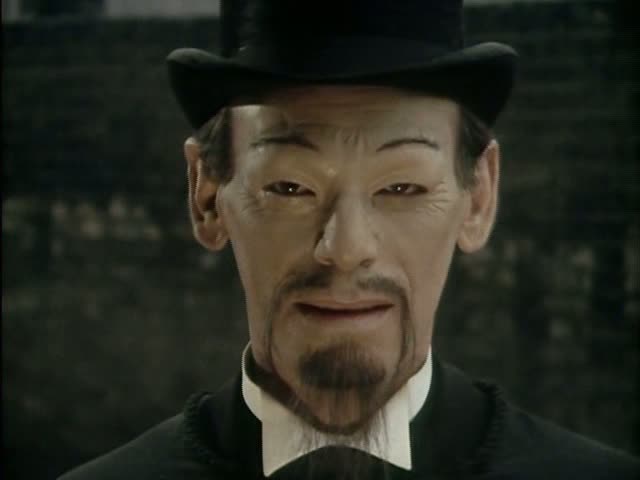 Thanks to the various people who looked over this and made suggestions, especially Holly. The mistakes are, of course, mine alone.
Thanks to the various people who looked over this and made suggestions, especially Holly. The mistakes are, of course, mine alone.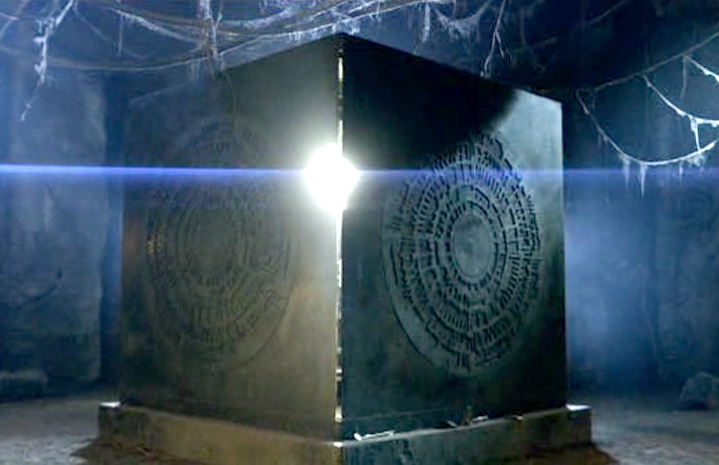 Hello everyone. This week it’s audio time. Again.
Hello everyone. This week it’s audio time. Again.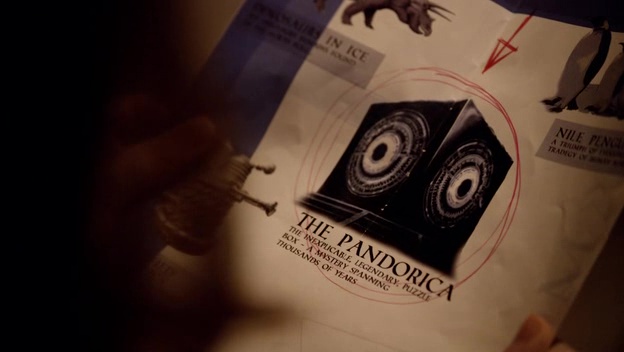 (Content note: This post references childhood sexual abuse, the objectifying male gaze, and the repression and processing of traumatic events in general.)
(Content note: This post references childhood sexual abuse, the objectifying male gaze, and the repression and processing of traumatic events in general.)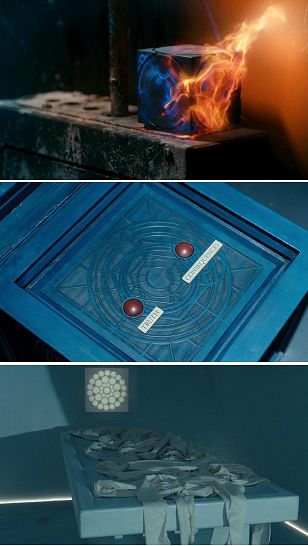 mathematically demonstrated to be an impossible problem, which is actually kind of delightful given the subsequent esoteric usages — for if such fusion is technically impossible, its success is necessarily transcendent, pointing to Ascension. Anyways, in basic symbolism, the Circle represents the infinite, the cyclical, the eternal, totality and perfection. The Square, on the other hand, represents material reality, the four corners of the earth, and subsequent limitation. As such, the Circle in the Square can represent a “union of opposites,” if you wish, or at the very least the immanence of the divine.
mathematically demonstrated to be an impossible problem, which is actually kind of delightful given the subsequent esoteric usages — for if such fusion is technically impossible, its success is necessarily transcendent, pointing to Ascension. Anyways, in basic symbolism, the Circle represents the infinite, the cyclical, the eternal, totality and perfection. The Square, on the other hand, represents material reality, the four corners of the earth, and subsequent limitation. As such, the Circle in the Square can represent a “union of opposites,” if you wish, or at the very least the immanence of the divine. 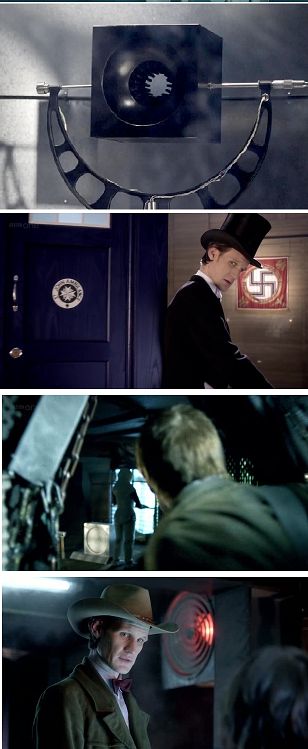 There are also sources like Elliott Wolfson’s Circle in the Square, which delves into the symbolism of the Kabbalah, and specifically into its gender implications. According to Wolfson, the Circle (with its curviness and suggestion of a hole) actually symbolizes the female, while the Square symbolizes the male, with the placement of one in the other not only suggesting union (alchemical or otherwise) but a particular hierarchical relationship.
There are also sources like Elliott Wolfson’s Circle in the Square, which delves into the symbolism of the Kabbalah, and specifically into its gender implications. According to Wolfson, the Circle (with its curviness and suggestion of a hole) actually symbolizes the female, while the Square symbolizes the male, with the placement of one in the other not only suggesting union (alchemical or otherwise) but a particular hierarchical relationship. 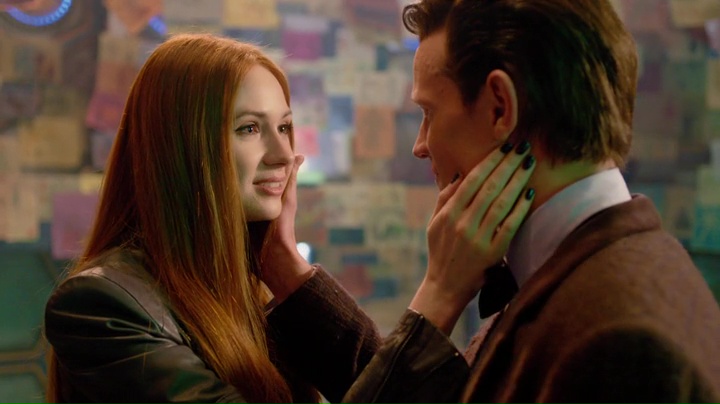 Last week we talked about the expression of the Beautiful throughout the history of Doctor Who, and gleaned different kinds of aesthetics employed by the show in the process – from awe at new, strange places… to the banal objectification of women… to an almost ritualized praise of monsters in the modern era. And it’s this latter sense of beauty that I find most interesting, given how monsters are now used in Doctor Who, especially in the Moffat era. Because monsters are no longer just villainous plot devices for generating scares. Quite often they are secret protagonists, and weighted with symbolic value, especially when juxtaposed with our main characters such that they become telling metaphors. This latter process I call the “monstering” of a character, and of particular interest to me is how Amy Pond becomes consistently monstered during her time on the show.
Last week we talked about the expression of the Beautiful throughout the history of Doctor Who, and gleaned different kinds of aesthetics employed by the show in the process – from awe at new, strange places… to the banal objectification of women… to an almost ritualized praise of monsters in the modern era. And it’s this latter sense of beauty that I find most interesting, given how monsters are now used in Doctor Who, especially in the Moffat era. Because monsters are no longer just villainous plot devices for generating scares. Quite often they are secret protagonists, and weighted with symbolic value, especially when juxtaposed with our main characters such that they become telling metaphors. This latter process I call the “monstering” of a character, and of particular interest to me is how Amy Pond becomes consistently monstered during her time on the show.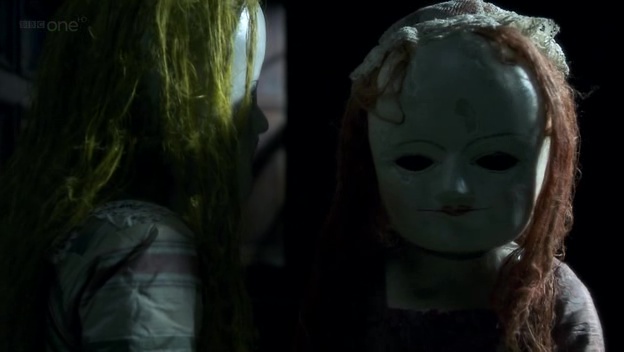 Contrast this with the monstering of Amy in Night Terrors. In Night Terrors, we see Amy transformed into a deadly Wooden Doll, the product of a child’s nightmare, a child who’s afraid of being abandoned. …
Contrast this with the monstering of Amy in Night Terrors. In Night Terrors, we see Amy transformed into a deadly Wooden Doll, the product of a child’s nightmare, a child who’s afraid of being abandoned. …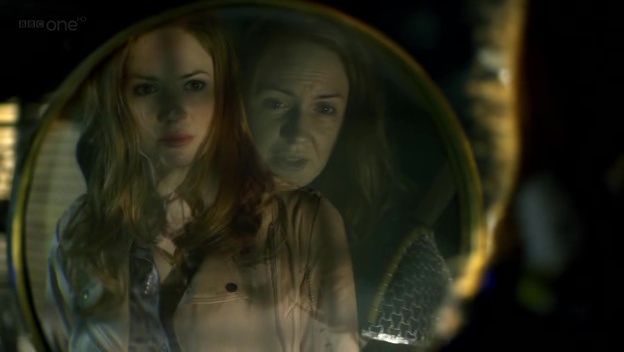 I’ve been thinking about doing another essay on monstering in Doctor Who, especially with regards to Amy Pond, but it occurs to me that this would really benefit in hindsight of a full survey on the show’s conception of beauty. Which is to say, I think the process of “monstering” is part and parcel of the modern show’s aesthetics, and what better way to explore those aesthetics than to come to some sort of understanding of the place where the Beautiful stands within it? Well, there’s probably several other better ways, but when it comes to Amy Pond, I think “beauty” isn’t a bad place to start. Not because Karen Gillan is classically beautiful, but because the character she plays actually articulates a philosophy of beauty that I find altogether more interesting:
I’ve been thinking about doing another essay on monstering in Doctor Who, especially with regards to Amy Pond, but it occurs to me that this would really benefit in hindsight of a full survey on the show’s conception of beauty. Which is to say, I think the process of “monstering” is part and parcel of the modern show’s aesthetics, and what better way to explore those aesthetics than to come to some sort of understanding of the place where the Beautiful stands within it? Well, there’s probably several other better ways, but when it comes to Amy Pond, I think “beauty” isn’t a bad place to start. Not because Karen Gillan is classically beautiful, but because the character she plays actually articulates a philosophy of beauty that I find altogether more interesting: